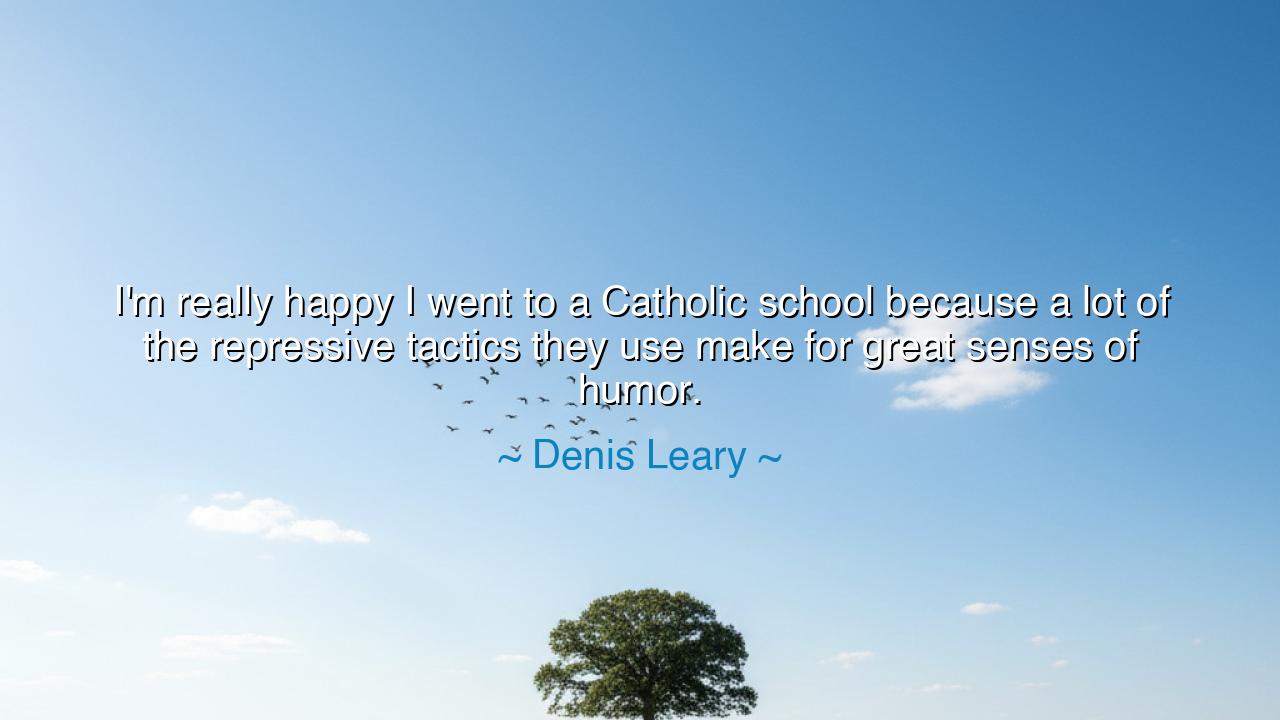
I'm really happy I went to a Catholic school because a lot of the
I'm really happy I went to a Catholic school because a lot of the repressive tactics they use make for great senses of humor.






In the words of Denis Leary, “I’m really happy I went to a Catholic school because a lot of the repressive tactics they use make for great senses of humor.” Though spoken with the sharp wit of a comedian, this saying conceals a profound truth about the human spirit: that humor is born not in comfort, but in constraint. When one is hemmed in by rules, when the spirit feels the weight of authority or repression, laughter becomes both rebellion and relief. It is the soul’s quiet way of preserving its freedom when every outward motion is controlled. Thus, what Leary calls “repressive tactics” become, in the long arc of the human heart, the very forge in which wit, irony, and resilience are tempered.
Catholic schools, in Leary’s memory, stood as places of order, morality, and strict discipline — where obedience was prized and deviation frowned upon. But from the sternness of such systems often springs a paradoxical gift: the ability to laugh at authority without hatred. For laughter allows the spirit to remain alive, creative, and self-aware, even when confined. The young student, taught to sit still and obey, learns instead to see the absurdity in the rigidity of rules. From that awareness grows humor, and from humor — survival. Leary’s words remind us that comedy is not born from joy alone, but from friction — from the meeting of freedom and restriction, of desire and denial.
The ancients knew this truth well. The playwright Aristophanes of Athens mocked politicians and philosophers alike, using laughter to challenge hypocrisy and expose folly. His comedies were acts of resistance wrapped in jest. Even the Roman satirists, such as Juvenal, wielded humor as a blade against the excesses of power. They, too, were raised under systems that valued order and authority, and it was from those systems that their voices of irony and wit emerged. Like Leary, they understood that comedy is the counterweight to control, the song of the mind that refuses to be silenced.
In this light, Leary’s gratitude is not sarcasm but insight. The “repressive tactics” of his schooling may have sought to mold him into obedience, but instead, they taught him perception — the ability to see contradiction and to laugh at it. Humor, in this way, becomes an instrument of freedom. It allows the human being to endure what might otherwise crush the soul. To laugh at fear is to strip it of its power; to find absurdity in oppression is to claim victory over it. Thus, what was meant to bind him instead refined him, making his mind sharper, his speech bolder, and his laughter truer.
Consider the story of Voltaire, the philosopher and satirist who lived in an age of censorship and religious control. He faced exile, imprisonment, and suppression for his ideas, yet he never ceased to laugh — not out of mockery, but out of understanding. His humor was his armor and his weapon; through wit, he could pierce dogma without bitterness. Like Leary, he found in the pressures of repression the spark of creative fire. “To learn who rules over you,” Voltaire wrote, “simply find out whom you are not allowed to criticize.” The repressed learn this lesson early, and through humor, they speak it boldly.
In truth, all human growth passes through some form of repression. Whether imposed by religion, society, or circumstance, restriction tests the elasticity of the soul. Those who yield become bitter or broken; those who adapt find laughter, and through it, liberty. Humor transforms suffering into strength, fear into perspective, and rigidity into rhythm. It is the alchemy of the heart — turning the heavy lead of repression into the golden light of understanding. This is the path of all great comedians and philosophers alike: to transform pain into wisdom, and wisdom into laughter.
Let this be the lesson drawn from Leary’s reflection: do not despise the forces that challenge you, for they may be the sculptors of your soul. When faced with rigidity, do not harden — become flexible. When silenced, learn to speak in the language of laughter. When repressed, find within yourself the art of irony, for it is the quiet rebellion that keeps your spirit free. To laugh is not to mock life, but to master it — to rise above it with grace, intelligence, and courage.
So, my listener, remember this: humor is the light that glows even in the dark halls of authority. It is the whisper of freedom that no rule can silence. Cherish it. Nurture it. For as Denis Leary teaches through jest, the very walls meant to contain you may one day echo with your laughter — and in that sound lies your victory, your wisdom, and your indestructible joy.






AAdministratorAdministrator
Welcome, honored guests. Please leave a comment, we will respond soon